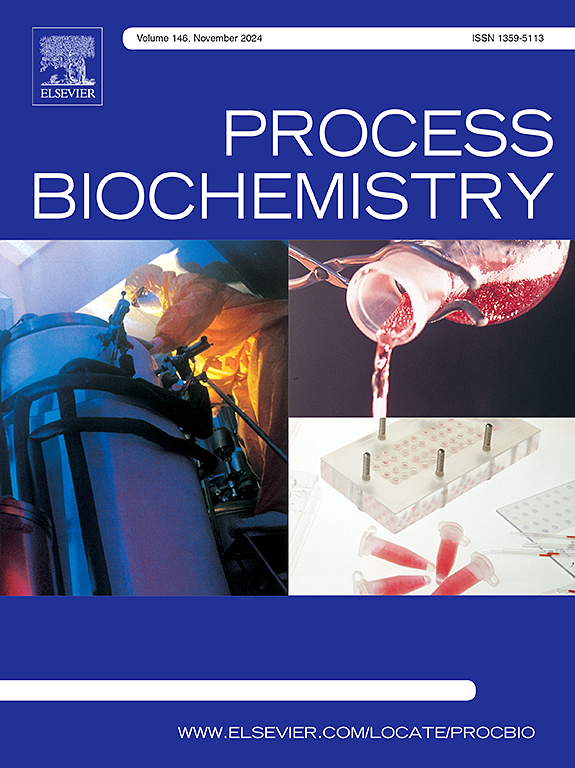荧光假单胞菌用组成型和非iptg诱导型启动子生产重组人胰岛素及规模化研究
IF 4
3区 生物学
Q2 BIOCHEMISTRY & MOLECULAR BIOLOGY
引用次数: 0
摘要
糖尿病是一种复杂的代谢紊乱,是全球最普遍的疾病之一。重组人胰岛素对糖尿病治疗至关重要,但也建议改变生活方式。胰岛素主要在细菌宿主系统中产生,因为它不需要任何复杂的ptm来发挥功能活性。传统上,在大多数这些系统中,iptg诱导启动子驱动表达;然而,IPTG具有细胞毒性且成本高。本研究探索了荧光假单胞菌表达平台中的其他调控元件,包括组成型和原生诱导型启动子。胰岛素原融合蛋白在2 L生物反应器中以高达54.5 mg/L的滴度表达,与使用组成型启动子(PPsbA)驱动系统的摇瓶相比,其滴度提高了~ 29%。通过对各种诱导剂及其浓度的系统筛选和优化,确定了以邻氨基苯甲酸酯(5 mM)和m-甲苯磺酸酯(7.5 mM)为诱导剂的邻氨基苯甲酸酯(PAnt)和苯甲酸酯(PBen)启动子为基础的表达系统的最佳诱导剂。放大到2 L的生物反应器进一步提高了产量,与烧瓶规模培养相比,pant介导的表达滴度提高了约7%。通过这些系统产生的融合蛋白和胰岛素通过Western blotting验证,并通过MALDI-TOF确认胰岛素的完整性。基于PAnt和pben的表达系统均可用于重组蛋白如胰岛素链的差异表达,以及单克隆抗体的重链和轻链。本研究展示了在P.荧光宿主系统中无iptg表达重组人胰岛素的过程。本文章由计算机程序翻译,如有差异,请以英文原文为准。
Production of recombinant human insulin using constitutive and non-IPTG inducible promoters in Pseudomonas fluorescens and scale-up study
Diabetes mellitus, a complex metabolic disorder, ranks among the most widespread diseases globally. Recombinant human insulin is crucial for diabetes treatment, although lifestyle modifications are also recommended. Insulin is majorly produced in bacterial host systems as it does not require any complex PTMs to be functionally active. Traditionally, IPTG-inducible promoters drive expression in most of these systems; however, IPTG is both cytotoxic and cost-intensive. This study explored alternative regulatory elements, including constitutive and native inducible promoters, in the Pseudomonas fluorescens expression platform. The proinsulin fusion protein was expressed at titers up to 54.5 mg/L in a 2 L bioreactor, yielding a ∼29 % increase compared to shake-flask using a constitutive promoter (PPsbA)-driven system. Anthranilate (5 mM) and m-toluate (7.5 mM) were identified as optimal inducers for anthranilate (PAnt) and benzoate (PBen) promoter-based expression systems, respectively, with systematic screening and optimization of various inducers and their concentrations. Scaling up to a 2 L bioreactor further enhanced production, with PAnt-mediated expression achieving a ∼7% titer increase over flask-scale cultures. The fusion protein and insulin produced through these systems were validated by Western blotting, and insulin integrity was confirmed via MALDI-TOF. Both PAnt- and PBen-based expression systems can be used for differential expression of recombinant proteins such as insulin chains, as well as the heavy and light chains of monoclonal antibodies. The present study demonstrates a process for the IPTG-free expression of recombinant human insulin in a P. fluorescens-based host system.
求助全文
通过发布文献求助,成功后即可免费获取论文全文。
去求助
来源期刊

Process Biochemistry
生物-工程:化工
CiteScore
8.30
自引率
4.50%
发文量
374
审稿时长
53 days
期刊介绍:
Process Biochemistry is an application-orientated research journal devoted to reporting advances with originality and novelty, in the science and technology of the processes involving bioactive molecules and living organisms. These processes concern the production of useful metabolites or materials, or the removal of toxic compounds using tools and methods of current biology and engineering. Its main areas of interest include novel bioprocesses and enabling technologies (such as nanobiotechnology, tissue engineering, directed evolution, metabolic engineering, systems biology, and synthetic biology) applicable in food (nutraceutical), healthcare (medical, pharmaceutical, cosmetic), energy (biofuels), environmental, and biorefinery industries and their underlying biological and engineering principles.
 求助内容:
求助内容: 应助结果提醒方式:
应助结果提醒方式:


